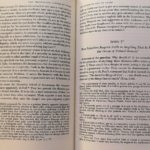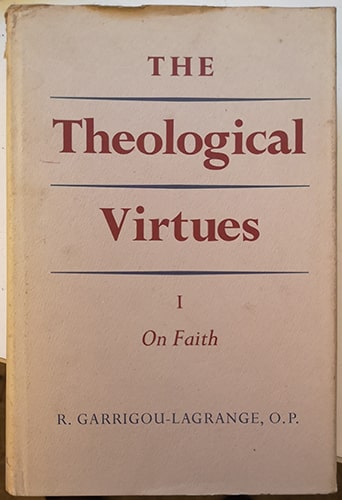 R. Garrigou-Lagrange, O.P. B. Herder, 1965. Hardcover with dustjacket, 480 pages. No marks, pages yellowed on outside edges, but not inside. weighs 940 grams.
R. Garrigou-Lagrange, O.P. B. Herder, 1965. Hardcover with dustjacket, 480 pages. No marks, pages yellowed on outside edges, but not inside. weighs 940 grams.
€20.
This book is so beautiful, such a masterpiece, that it is difficult for me to convey just to what extent. In this book, Father Garrigou-Lagrange gives a deep theological treatise on the theological virtue of faith. Although the subtitle is that it is a commentary on several questions from the Summa of Aquinas, it does not read like a strict commentary. Rather, the Summa seems to be almost a jumping off point for this discussion of faith.
 I cannot hope to give a full summary account, but I will discuss a few key aspects that I learned and found particularly insightful. First, Father GL distinguishes between “infused” faith and “acquired” faith. The former is the supernatural faith given by God, most properly associated with the theological virtue i.e. it is a supernatural object with a supernatural motive (God). The latter, however, is a natural object with a natural motive. Infused faith of course builds off of this acquired faith. However, this helps to explain how in the book of James, for example, Saint James can say that the demons have faith. They do not have supernatural, saving faith, but rather acquired faith. This point is further emphasized when we learn that God is the object of faith. That is, the supernatural object of faith is God’s authority revealing as well as God himself (this is called the formal object quo and quod). This, by the way, is why belief in the existence of God is a matter of reason and not a matter of faith. God, being the object of faith, must exist and be believed in already before one can have faith, hence belief in the existence of God is not a matter of faith. This is also why heretics cannot have faith, even if they only reject a single proposition. This is because rejection of a single proposition implies that the heretic’s motive for believing is not in God revealing or based in God himself, but in some other motive. For how could someone believe only some of what God reveals and reject other truths that God reveals?
I cannot hope to give a full summary account, but I will discuss a few key aspects that I learned and found particularly insightful. First, Father GL distinguishes between “infused” faith and “acquired” faith. The former is the supernatural faith given by God, most properly associated with the theological virtue i.e. it is a supernatural object with a supernatural motive (God). The latter, however, is a natural object with a natural motive. Infused faith of course builds off of this acquired faith. However, this helps to explain how in the book of James, for example, Saint James can say that the demons have faith. They do not have supernatural, saving faith, but rather acquired faith. This point is further emphasized when we learn that God is the object of faith. That is, the supernatural object of faith is God’s authority revealing as well as God himself (this is called the formal object quo and quod). This, by the way, is why belief in the existence of God is a matter of reason and not a matter of faith. God, being the object of faith, must exist and be believed in already before one can have faith, hence belief in the existence of God is not a matter of faith. This is also why heretics cannot have faith, even if they only reject a single proposition. This is because rejection of a single proposition implies that the heretic’s motive for believing is not in God revealing or based in God himself, but in some other motive. For how could someone believe only some of what God reveals and reject other truths that God reveals?



